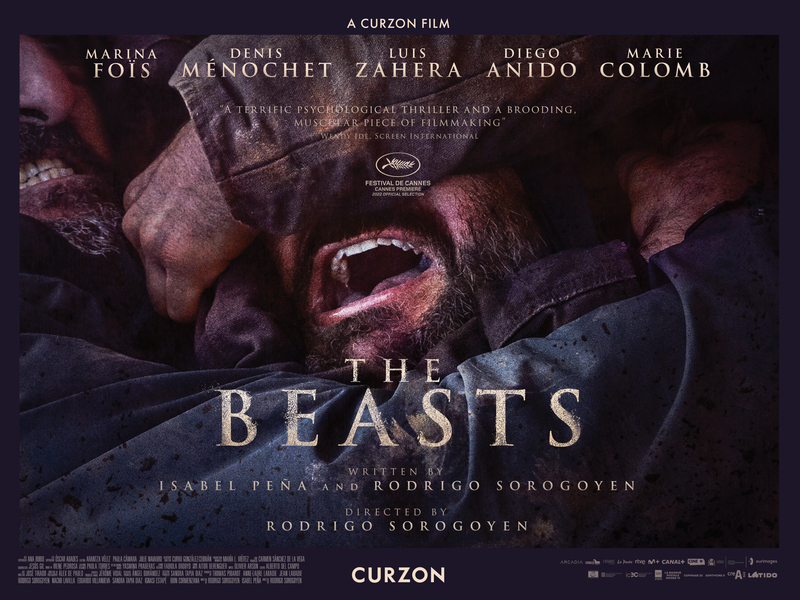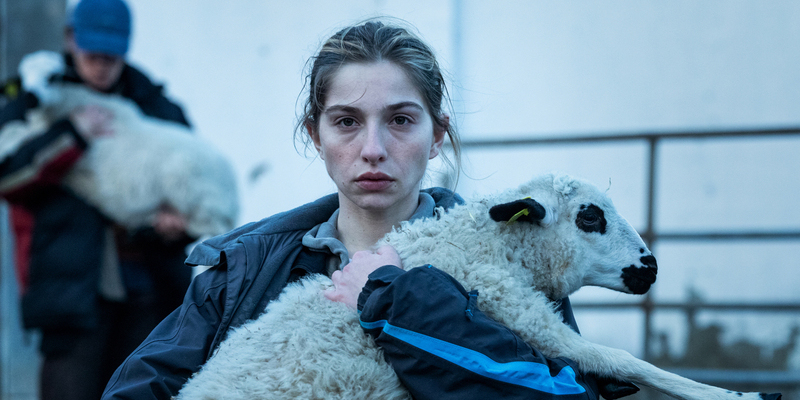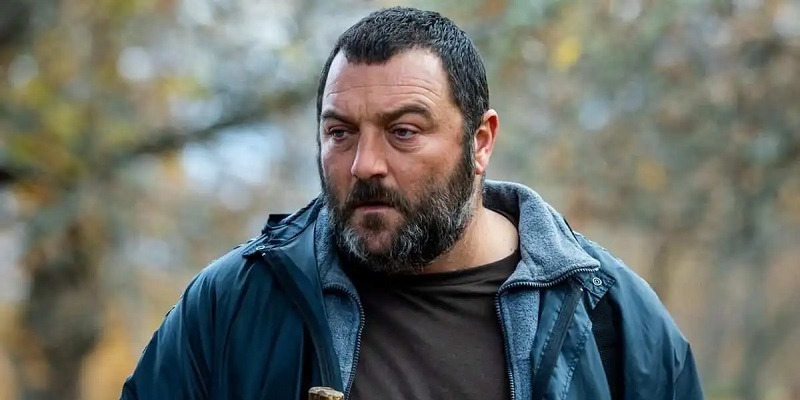![New Release Review [Cinema/Curzon] - THE BEASTS](https://blogger.googleusercontent.com/img/b/R29vZ2xl/AVvXsEh869RumJnPHwL6jrdZ1YPVqsfANuboJZ9l5TDLnXzMNvYhQUOaL6RuU9iQDPKj8h6znFF-YYWYQzFYrekBeSo21CZSsMdms7kyOAzz2lxHiswbvxxdM-RtPIGbwvJcj6RVATovjZNoET24rbXpZWqHw7FxJHF9bOGTi8XAva_g58hUoz8yKXnuxhO5/s16000/the-beasts-review.jpg)
Review by Eric Hillis
Directed by: Rodrigo Sorogoyen
Starring: Denis Ménochet, Marina Foïs, Luis Zahera, Diego Anido, Marie Colomb

Following Jonathan Cenzual Burley's
El Pastor
and Carla Simón's
Alcarras, Rodrigo Sorogoyen's The Beasts is another
Spanish drama about folk trying to hold onto their patch of rural land
amid development. The difference here is that the stubborn protagonists
aren't native Spanish but an interloping French couple, Antoine (Denis Ménochet) and Olga (Marina Foïs).

Educated and middle class, Antoine and Olga have relocated to Spain's
Galicia region and set up a small vegetable farm, the product of which
they sell at a local market. In their spare time they repair abandoned
homes in the area, in the hopes that some day more people like
themselves might be attracted to moving, thus fuelling their
business.
At the point where The Beasts begins, Antoine is deep
into an increasingly aggressive dispute with a pair of local brothers –
the sinister Xan (Luis Zahera) and his mentally challenged
younger brother Lorenzo (Diego Anido) – over his refusal to sign
away his land to a power company that wishes to erect wind turbines in
the area. Antoine voted against the plan for two reasons – one, he
worries about the impact on the environment, and two, he considers the
area his home and isn't about to move. Antoine is constantly reminded by
Xan that it isn't really his home, that he's just an interloper. Xan,
along with several other locals, wants the money from the land sale so
he can leave an area that has long lost its charm for him. In an attempt
to persuade Antoine to leave, he wages a war that begins with gentle
mocking (constantly referring to Antoine as "Frenchy") but soon
escalates to threats of violence.

Ever since Straw Dogs and Deliverance, rural folk have been getting a raw deal in cinema, portrayed as
savages who will turn to rape and violence at the drop of a hat,
particularly if they feel threatened by sophisticated city folk.
The Beasts has much in common with Peckinpah's film,
though it distinguishes itself in a couple of key areas. For one, the
hulking Menochet is the physical opposite of the wiry Dustin Hoffman, so
much so that it's hard to imagine Xan or Lorenzo being able to take him
down. This idea of "taking him down" is pre-figured by an opening
sequence in which we watch a pair of local men grapple a horse to the
ground, an image later called back to when things really escalate
between the two warring parties. Casting an actor with the imposing
frame of Menochet is counter-intuitive, but much like the casting of
George C. Scott in ghost story The Changeling, it works because if someone who looks like Menochet feels scared
we're forced to take the scenario seriously.
The other key deviation from other movies that pit city slickers
against country bumpkins is that Sorogoyen's film forces us to consider
the latter's point of view, even if it never condones their actions.
Antoine and Olga are essentially guilty of gentrification, and in
renovating the area's abandoned dwellings they hope to attract more
wealthy foreigners. It's easy to see why the locals might be wary of
having their area and culture impacted in such a manner. Plus, there's
also the issue of the money, which may be chicken feed to the affluent
French couple but which would greatly improve the lives of the locals.
In what David Lynch would call The Beasts' "eye of the duck" scene, Antoine and Xan have a lengthy, one-take
discussion in which Xan lays out his frustrations. He's angry that
someone who just moved to the area and essentially farms as a hobby is
entitled to the same rights as people who have lived there all their
lives and for whom farming is a tough means of survival. You can kind of
see his point, and if it's not clear then imagine if Antoine and Olga
had pitched up in a part of Africa and were similarly denying the native
population a chance to escape poverty so they could live out their hippy
fantasy. It doesn't go down so well, does it?

Ultimately, due to Xan's escalation to violence, we find ourselves
taking the side of Antoine, though I admit from a personal perspective
this may be down to finding him more relatable as a fellow urbanite.
When Sorogoyen takes the narrative into full-on thriller territory, he
does so in stunningly effective fashion. The Beasts is one
of the most tense films I've seen in recent years, and that Sorogoyen is
able to make us identify with a character who isn't entirely likeable is
testament to his skills in cinematic manipulation. A sequence in which
Antoine is stalked in the woods by Xan and Lorenzo is a bravura piece of
filmmaking that will have you digging your nails into your armrest in
apprehension. Antoine may be twice the size of his aggressors, but he's
firmly in their territory, and despite his claims, it's a land he
doesn't really know like the locals.


